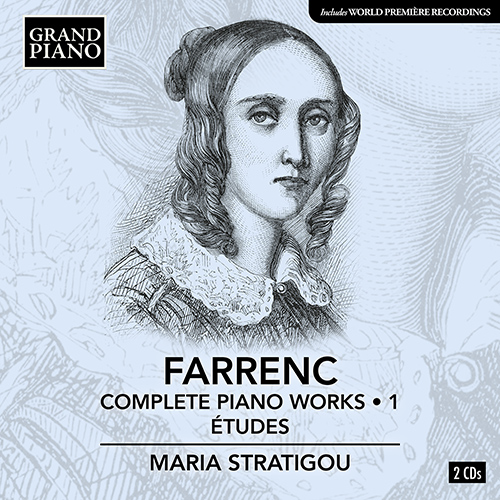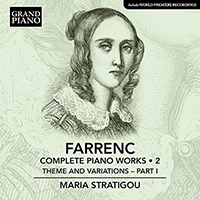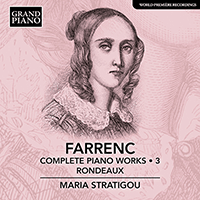
About this Release
“When I read Bea Friedland’s book on Louise Farrenc’s life and music I was astonished by the seriousness and depth of her musical studies, her continuous work and research on music, and the number of similarities with artists nowadays regarding the struggles and challenges of establishing themselves in the music profession. What is so special about these works is the plethora of musical styles and the optimum balance of technique and musicality. As a pianist and researcher my job was to make my performance decisions through a detailed analysis of the scores, and choose what I thought would be the most accurate representation of the pieces. I hope my recordings will make Louise Farrenc’s music better known among music lovers and help give this remarkable composer the recognition that she deserves.” — Maria Stratigou
FARRENC, LOUISE (1804–1875)
Complete Piano Works • 1
- Maria Stratigou, piano
Louise Farrenc was one of the most respected pianists and composers in the 19th-century Parisian music scene, and her four sets of Études are her most important compositions for piano. Beautiful melodies and distinctiveness of character have made the Études, Op. 26 the most popular set, but all of these pieces are full of grace and charm alongside their didactic usefulness in their references to the styles both of Farrenc’s musical ancestors and her contemporaries. The Greek pianist Maria Stratigou is one of Louise Farrenc’s greatest exponents and makes her Grand Piano debut with these exquisite rarities.
Tracklist
|
30 Études, Op. 26 (1838) (00:08:00 )
|
|
1
No. 1 in C Major: Allegro moderato ed energico (00:01:33)
|
|
2
No. 2 in C Major: Moderato (00:01:06)
|
|
3
No. 3 in A Minor: Allegro non troppo (00:01:28)
|
|
4
No. 4 in G Major: Allegro moderato (00:02:00)
|
|
5
No. 5 in E Minor: Vivace (00:02:10)
|
|
6
No. 6 in D Major: Andante grazioso (00:01:38)
|
|
7
No. 7 in D Major: Andante espressivo (00:01:45)
|
|
8
No. 8 in B Minor: Andantino (00:03:25)
|
|
9
No. 9 in A Major: Andante con moto (00:01:41)
|
|
10
No. 10 in F-Sharp Minor: Adagio (00:04:27)
|
|
11
No. 11 in E Major: Presto (00:02:49)
|
|
12
No. 12 in E Major: Moderato. Fuga a due Soggetti (00:03:45)
|
|
13
No. 13 in C-Sharp Minor: Moderato. Canone (00:02:38)
|
|
14
No. 14 in B Major: Vivace (00:02:34)
|
|
15
No. 15 in G-Sharp Minor: Andante affettuoso (00:02:49)
|
|
16
No. 16 in F-Sharp Major: Andante grazioso (00:02:05)
|
|
17
No. 17 in E-Flat Minor: Allegro agitato (00:01:28)
|
|
18
No. 18 in D-Flat Major: Moderato, e cantabile (00:02:31)
|
|
19
No. 19 in B-Flat Minor: Presto (00:01:46)
|
|
20
No. 20 in A-Flat Major: Allegretto. Canone (00:01:30)
|
|
21
No. 21 in A-Flat Major: Adagio (00:04:29)
|
|
22
No. 22 in F Minor: Allegro molto (00:03:39)
|
|
23
No. 23 in E-Flat Major: Fuga (00:01:41)
|
|
24
No. 24 in E-Flat Major: Tempo di marcia (00:04:09)
|
|
25
No. 25 in C Minor: Allegro energico (00:01:53)
|
|
26
No. 26 in B-Flat Major: Moderato (00:02:01)
|
|
27
No. 27 in G Minor: Allegro agitato (00:02:56)
|
|
28
No. 28 in F Major: Allegro spiritoso (00:01:13)
|
|
29
No. 29 in D Minor: Fuga. Andante (00:02:24)
|
|
30
No. 30 in D Minor: Allegro (00:01:24)
|
|
12 Études brillantes, Op. 41 (1853) (00:22:00 )
|
|
1
No. 1 in C Minor: Allegro con fuoco (00:01:57)
|
|
2
No. 2 in G Major: Allegro moderato (00:02:20)
|
|
3
No. 3 in D Minor: Allegro (00:01:52)
|
|
4
No. 4 in B-Flat Major: Allegretto (00:01:39)
|
|
5
No. 5 in D-Flat Major: Andante con moto (00:03:51)
|
|
6
No. 6 in F Minor: Allegro maestoso (00:02:16)
|
|
7
No. 7 in E-Flat Major: Andante espressivo (00:01:21)
|
|
8
No. 8 in C Minor: Allegro (00:01:26)
|
|
9
No. 9 in C Major: Vivace (00:01:24)
|
|
10
No. 10 in A Minor: Vivace (00:01:15)
|
|
11
No. 11 in F Major: Allegro (00:01:14)
|
|
12
No. 12 in B Minor: Moderato (00:01:53)
|
|
20 Études de moyenne difficulté, Op. 42 (1854) (00:22:00 )
|
|
13
No. 1 in E Minor: Allegro moderato (00:00:56)
|
|
14
No. 2 in G Major: Vivace e leggiero (00:00:48)
|
|
15
No. 3 in C Major: Andante (00:01:09)
|
|
16
No. 4 in A Minor: Allegro moderato (00:00:53)
|
|
17
No. 5 in F Major: Allegretto (00:01:36)
|
|
18
No. 6 in D Minor: Andante con moto (00:00:58)
|
|
19
No. 7 in D Major: Moderato (00:01:03)
|
|
20
No. 8 in G Major: Andante (00:01:06)
|
|
21
No. 9 in D Major: Allegro (00:00:48)
|
|
22
No. 10 in G Minor: Allegro (00:00:54)
|
|
23
No. 11 in E-Flat Major: Andante (00:01:25)
|
|
24
No. 12 in B-Flat Major: Moderato (00:01:27)
|
|
25
No. 13 in F Major: Poco lento (00:01:17)
|
|
26
No. 14 in C Major: Allegro (00:00:45)
|
|
27
No. 15 in F Major: Andante (00:01:08)
|
|
28
No. 16 in A Major: Allegretto scherzando (00:00:51)
|
|
29
No. 17 in A Minor: Moderato (00:01:17)
|
|
30
No. 18 in E Major: Andante grazioso (00:01:01)
|
|
31
No. 19 in F-Sharp Major: Adagio religioso, molto legato (00:01:22)
|
|
32
No. 20 in B Minor: Poco allegro (00:01:22)
|
|
25 Études faciles, Op. 50 () (00:25:00 )
|
|
33
No. 1. Pour bien lier le chant: Andante grazioso (00:00:47)
|
|
34
No. 2. Pour la précision dans la mesure à 6/8: Andantino (00:01:32)
|
|
35
No. 3. Pour exercer le staccato léger dans les deux mains: Allegretto (00:00:42)
|
|
36
No. 4. Pour les batteries avec une partie soutenue: Poco allegro (00:00:44)
|
|
37
No. 5. Pour alterner avec égalité des deux mains dans les accords: Allegro moderato (00:00:31)
|
|
38
No. 6. Pour détacher légèrement de deux en deux avec d'inégales valeurs: Allegretto (00:00:58)
|
|
39
No. 7. Pour exercer le trille. Il doit y avoir une terminaison même lorsqu'elle n'est pas écrite: Andante grazioso (00:02:14)
|
|
40
No. 8. Pour les tierces liées: Allegretto (00:00:48)
|
|
41
No. 9. Pour l'égalité dans les gammes: Allegro moderato (00:00:40)
|
|
42
No. 10. Pour lier et soutenir le chant dans la main droite: Andante espressivo (00:01:30)
|
|
43
No. 11. Pour l'égalité des arpèges mêlés de silences: Poco allegro (00:00:37)
|
|
44
No. 12. Pour exercer les batteries de la main gauche: Allegro (00:00:43)
|
|
45
No. 13. Pour bien lier une basse chantante: Andante (00:01:13)
|
|
46
No. 14. Pour acquérir de la vivacité et de l'égalité dans les deux mains: Allegro (00:00:46)
|
|
47
No. 15. Mouvement de Valse que l'on doit jouer d'une manière gracieuse: Vivo (00:00:42)
|
|
48
No. 16. Pour bien lier les doubles et triples notes: Andante (00:01:20)
|
|
49
No. 17. Pour exercer divers genres de batteries: Allegro (00:01:55)
|
|
50
No. 18. Mouvement de Valse dans le genre lié: Allegro moderato (00:01:08)
|
|
51
No. 19. Pour l'égalité dans des valeurs semblables des deux mains: Andante con moto (00:00:36)
|
|
52
No. 20. Pour alterner également deux par deux avec chaque main: Allegro moderato (00:00:53)
|
|
53
No. 21. Pour exercer et faire entendre bien exactement les doubles et triples notes: Poco allegro (00:00:44)
|
|
54
No. 22. Pour donner de la légèreté et de la souplesse à la main gauche: Allegretto (00:01:13)
|
|
55
No. 23. Exercice pour la répétition d'une même figure: Allegro (00:00:37)
|
|
56
No. 24. Pour les notes liées, à plusieurs parties: Andante (00:00:53)
|
|
57
No. 25. Pour l'égalité dans les triolets, des deux mains: Allegro (00:01:25)
|
The Artist(s)
 Dr Maria Stratigou studied at the Conservatory of Athens, the Royal Conservatoire of Scotland and the Royal Northern College of Music, where she completed her PhD Performance Aspects of Louise Farrenc’s Piano Études. She is currently a teaching associate (Performance) at the University of Sheffield. Stratigou has given lecture-recitals and paper presentations at numerous international conferences on this subject. She has performed across Europe and is the recipient of numerous prestigious awards, including the ’Eleni Tim. Mykoniou’ Prize for Piano (Academy of Athens, 2013) and First Prizes at the Jock Holden Memorial Mozart Piano Prize Competition at the RCS (2008) and various Panhellenic piano competitions.
Dr Maria Stratigou studied at the Conservatory of Athens, the Royal Conservatoire of Scotland and the Royal Northern College of Music, where she completed her PhD Performance Aspects of Louise Farrenc’s Piano Études. She is currently a teaching associate (Performance) at the University of Sheffield. Stratigou has given lecture-recitals and paper presentations at numerous international conferences on this subject. She has performed across Europe and is the recipient of numerous prestigious awards, including the ’Eleni Tim. Mykoniou’ Prize for Piano (Academy of Athens, 2013) and First Prizes at the Jock Holden Memorial Mozart Piano Prize Competition at the RCS (2008) and various Panhellenic piano competitions. The Composer(s)
 Louise Farrenc was one of the most respected pianists and composers in the 19th-century Parisian music scene, and her four sets of Études are her most important compositions for piano. Beautiful melodies and distinctiveness of character have made the Études, Op. 26 the most popular set, but all of these pieces are full of grace and charm alongside their didactic usefulness in their references to the styles both of Farrenc’s musical ancestors and her contemporaries. The Greek pianist Maria Stratigou is one of Louise Farrenc’s greatest exponents and makes her Grand Piano debut with these exquisite rarities.
Louise Farrenc was one of the most respected pianists and composers in the 19th-century Parisian music scene, and her four sets of Études are her most important compositions for piano. Beautiful melodies and distinctiveness of character have made the Études, Op. 26 the most popular set, but all of these pieces are full of grace and charm alongside their didactic usefulness in their references to the styles both of Farrenc’s musical ancestors and her contemporaries. The Greek pianist Maria Stratigou is one of Louise Farrenc’s greatest exponents and makes her Grand Piano debut with these exquisite rarities. Reviews
“Stratigou has a full mastery of Farrenc’s romantic style and a technique to match. I can only hope that she continues on this journey. This is a quite auspicious beginning to what I expect to be a very enjoyable exploration of piano music that deserves to be better known.” – American Record Guide

“Two discs packed with beguiling piano music, confirming once again that Farrenc has been unjustly neglected as a composer. The Op. 26 Etudes in particular display a remarkable range of moods, technical demands and captivating melodies.” – BBC Music Magazine
“Stratigou concentrates on the musicality of the etudes. Melodies are beautifully phrased. And no matter how complex the music, it never sounds busy or cluttered.” – WTJU

“Two CDs feature 87 etudes by the French composer, played by Stratigou sometimes very vital and virtuosic, sometimes very charming, always inspired and therefore going beyond the didactic value of the pieces.” – Pizzicato



 Grand Piano has gained a reputation for producing high quality recordings of rare keyboard gems. Dedicated to the exploration of undiscovered piano repertoire, the label specialises in complete cycles of piano works by many lesser-known composers, whose output might otherwise have remained unknown and unrecorded.
Grand Piano has gained a reputation for producing high quality recordings of rare keyboard gems. Dedicated to the exploration of undiscovered piano repertoire, the label specialises in complete cycles of piano works by many lesser-known composers, whose output might otherwise have remained unknown and unrecorded.






